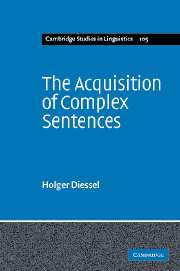Book contents
- Front matter
- Contents
- Figures
- Tables
- Acknowledgements
- Abbreviations
- 1 Introduction
- 2 A dynamic network model of grammatical constructions
- 3 Towards a definition of complex sentences and subordinate clauses
- 4 Infinitival and participial complement constructions
- 5 Complement clauses
- 6 Relative clauses
- 7 Adverbial and co-ordinate clauses
- 8 Conclusion
- Appendix
- References
- Author index
- Subject index
6 - Relative clauses
Published online by Cambridge University Press: 22 September 2009
- Front matter
- Contents
- Figures
- Tables
- Acknowledgements
- Abbreviations
- 1 Introduction
- 2 A dynamic network model of grammatical constructions
- 3 Towards a definition of complex sentences and subordinate clauses
- 4 Infinitival and participial complement constructions
- 5 Complement clauses
- 6 Relative clauses
- 7 Adverbial and co-ordinate clauses
- 8 Conclusion
- Appendix
- References
- Author index
- Subject index
Summary
Like complement clauses, relative clauses emerge from simple nonembedded sentences. The earliest relative clauses occur in presentational constructions that consist of a copular clause and a relative clause including an intransitive verb. Although these constructions are biclausal they denote only a single situation. The presentational copular clause does not serve as an independent assertion; rather, it functions to establish a referent in focus position, making it available for the predication expressed in the relative clause. The whole sentence thus contains only a single proposition, leading children frequently to conflate the two clauses: many of the early relative constructions are syntactic blends (or amalgams) in which the relative clause and the matrix clause are merged into a single syntactic unit. As children grow older, they begin to use more complex relative constructions. In contrast to the early presentational relatives, the relative constructions produced by older children denote two situations in two full-fledged clauses. Based on these data I argue that complex sentences including relative clauses develop via clause expansion: starting from presentational relatives that denote a single situation, children gradually learn the use of complex relative constructions in which two situations are expressed by two separate full clauses.
- Type
- Chapter
- Information
- The Acquisition of Complex Sentences , pp. 116 - 148Publisher: Cambridge University PressPrint publication year: 2004



